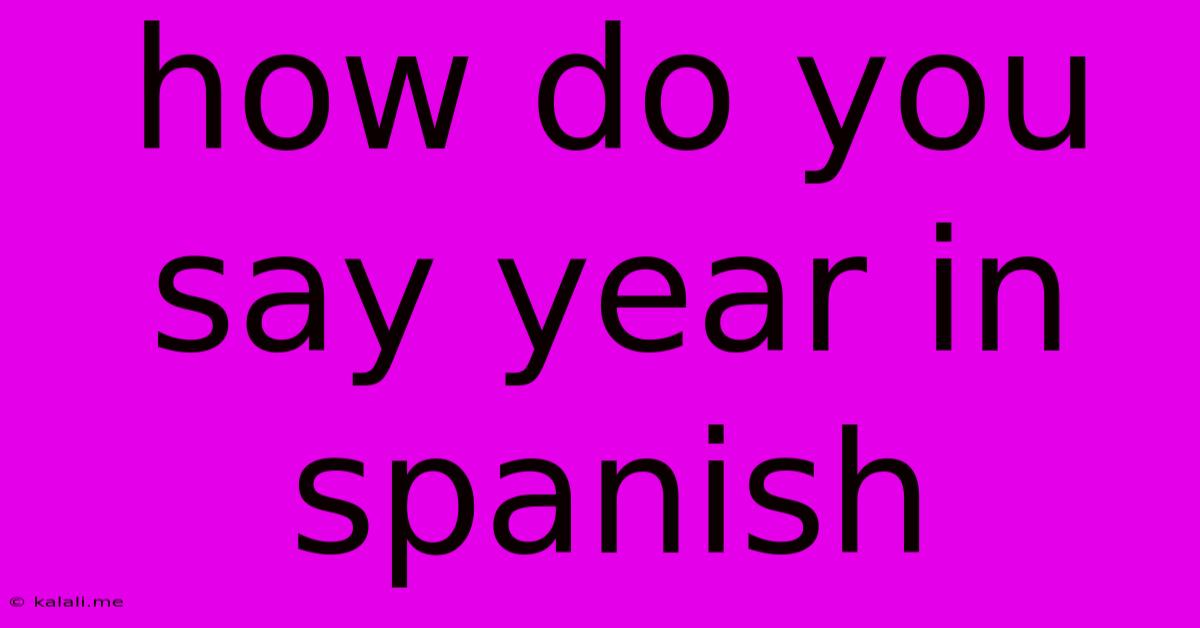How Do You Say Year In Spanish
Kalali
May 30, 2025 · 2 min read

Table of Contents
How Do You Say "Year" in Spanish? A Comprehensive Guide
Knowing how to say "year" in Spanish is a fundamental step for anyone learning the language. It's a word you'll use frequently, from discussing ages to talking about dates and timelines. But the answer isn't as simple as one single word. This guide explores the different ways to say "year" in Spanish, depending on the context and nuance you want to convey.
This article will cover the most common translations for "year," including variations based on context, and help you avoid common mistakes made by Spanish learners. We'll also look at related vocabulary and phrases to expand your Spanish vocabulary.
The Most Common Translation: "Año"
The most straightforward and widely used translation for "year" in Spanish is "año". This is the word you'll use in most situations. For example:
- "This year is going to be great." translates to: "Este año va a ser genial."
- "Next year I'm going to travel to Spain." translates to: "El año que viene voy a viajar a España."
- "What year were you born?" translates to: "¿En qué año naciste?"
Variations and Nuances
While "año" covers most instances, Spanish offers subtleties that allow for more precise expression. Let's explore some of them:
-
"Año bisiesto": This translates to "leap year." Knowing this phrase will help you accurately discuss calendar anomalies.
-
"Años": This is the plural form of "año," used when talking about multiple years. For instance, "five years ago" would be "hace cinco años."
-
Contextual Usage: The best way to choose the correct word is to consider the context of your sentence. Sometimes a more descriptive phrase might be better than just "año." For example, instead of saying "last year's harvest," you could say "la cosecha del año pasado" which translates more naturally.
Related Vocabulary to Expand Your Knowledge
Learning related vocabulary enhances your understanding and fluency. Consider these additions to your Spanish lexicon:
- "Edad": This means "age," often used in conjunction with "año" to express someone's age (e.g., "Tengo 30 años" - I am 30 years old).
- "Anual": This means "annual," referring to something that happens yearly.
- "Anualmente": This means "annually," or "yearly."
- "Decenio": This means "decade," referring to a period of ten years.
- "Siglo": This means "century," referring to a period of 100 years.
Mastering "Año" and Beyond
Understanding how to say "year" in Spanish isn't just about memorizing a single word; it's about grasping the nuances and related vocabulary that allows for more natural and fluent conversation. By incorporating these tips and expanding your vocabulary, you'll be well on your way to confidently discussing time and dates in Spanish. Practice using "año" in different sentences and contexts to solidify your understanding and fluency. Remember that consistent practice is key to mastering any new language!
Latest Posts
Latest Posts
-
Describe All Solutions Of Ax 0
May 31, 2025
-
Then In The Beginning Of A Sentence
May 31, 2025
-
Does Anyone Know Any Way To Get A
May 31, 2025
-
Could Not Open Lock File Var Lib Dpkg Lock Frontend
May 31, 2025
-
Why Does Lego Use Different Colors For Technic
May 31, 2025
Related Post
Thank you for visiting our website which covers about How Do You Say Year In Spanish . We hope the information provided has been useful to you. Feel free to contact us if you have any questions or need further assistance. See you next time and don't miss to bookmark.